- Home
- William Golding
The Double Tongue Page 9
The Double Tongue Read online
Page 9
‘I went to sleep.’
‘You seemed wide enough awake to me – just sufficient touch of the, the “numinous” in your voice to carry complete conviction.’
‘Numinous?’
‘A word the Romans use. Means – spooky. Trust them, they’re the most superstitious people in the world. God knows how they’ve got where they have. But when you answered the woman who wanted to know about her dead daughter the whole group of them started weeping. I very nearly did myself. How did you know that the child was called Lelia?’
‘What child?’
‘In any case, my dear, we have some completely satisfied customers. I’m not sure really that your “forte” doesn’t lie in dealing with the simple rather than the complex! That woman took off her own earrings and added them to the drachmas. Not that they’re much good – silver allegedly. Leontes will know.’
‘I didn’t know anything. I was asleep! Can’t you believe me?’
‘If you say so, of course. But if just sprinkling the stuff and then sniffing the smoke takes you that way I wonder how you’d have managed in the old days? The early Pythias used to chew the leaves, the fresh ones. If you’ll notice, no animal eats laurel leaves, not even insects. They know. How I wish we did. But I think it’s time you got ready.’
Ionides said he wished he knew but I don’t think he did so wish. I was beginning to understand him. Most of his mind was a kind of shell of opinions and brittle quips. Inside the shell was a mind made up and closed to change because it was really a prime tenet of his that he knew. In the shell itself were contrary opinions which he produced together with their opposites so that he was secure from having to believe in any of them. I began to see how the oracle, like Ionides, was surrounded by contradictions. Whatever lay at the centre of the oracle, that mysterious heart of it which spoke so often with riddling words so that only a suppliant who was both wise and humble could choose the right interpretation, I believed, no, I felt I knew there was something connected with the hidden centre of existence that lay there and sometimes spoke.
That day was the third day of oracular utterance, and Ionides said he would have cancelled it had he known that there would be only two suppliants and very bad weather. It seemed foolish to go through all the outside ceremonial – the wrapped Pythia, the festival vehicle which I had never seen and the solemn ritual of the Descent. I recognized, wrapped and blind though I was, that the vehicle was a different one and since I heard no onlookers in the street I dared a look. I found I was riding in an ordinary, rather dirty cart. There was one driver and one horse, hairy and slow. That’s right, I thought. That’s how it must have been, back in the old days just after the god had killed the monster. I had a kind of joke with myself that one day this cart would be all there was to take me to the cave and that the priest of Apollo would have to drive it himself. But now the rain was falling, beating on the great cloak they had thought to fold round my wrappings and I desired nothing so much as to get into the grotto out of the rain. At one point the horse stopped and staled there in the empty street and I came near to shouting at the driver. When we reached the portico it was Ionides himself who helped me down, murmuring as he did so, ‘I can’t lift you. You’ll have to help yourself.’
So once inside I let the cloak fall, and could see the steps going down before me. I was wet, for all the cloak, and in a temper. I spoke sharply to Ionides, calling him Ion and asking him why he hadn’t the wit to keep a Pythia dry and he answered that a Pythia with a god’s help ought to be able to get out of a shower of rain. It was not edifying there on the steps going down to the oracle of the god. I became aware of this as I descended the wet and slippery steps and the god made me fall, which I deserved though he did nothing to Ionides who was as blameable as I. I thought of my father’s words so long ago, ‘In these cases my dear, it is almost always the girl’s fault.’ I had hurt my elbow, and stood in front of the tripod, rubbing the ache out of the bone. I suppose it was that hurt and the delay – let them wait! – that made me examine the curtain at the back of the grotto, though I went no nearer to it. I saw now that it was a representation of the fight between Apollo and the monster in what even I could see was intended to be the archaic manner. But what I had not noticed before was that there were two curtains side by side, drawn together by drawstrings. It only needed a pull on one of the strings to draw the curtains apart and reveal what they covered. I had a mind to go forward and solve a part of Apollo’s mysteries. But as I debated that in my mind I heard Ionides’ voice.
‘Crates of Corinth – of wealthy Corinth – begs the god to tell him –’
I forget precisely what Crates wanted. What he got was an oracle given from Ionides’ suddenly obsequious mouth which was mentioning large sums of money. The only other suppliant was a farmer whose farm was what he called ‘sick’ and what should he do about it? I began to feel we were very wicked. Ionides went up the steps, looked round in the street and then came back.
‘All over. I’ll call the cart back.’
It was in my mind to tell him not to bother and that I would walk. He and I might stroll out together, he with his sacred insignias over his arm, I with my scarf casually lying round my neck under a bare face, much as the performers of a marionette show will come out from the booth when the play is done and mingle with their own audience. It was, I said to myself, very nearly what the oracle had come to.
But then – there had always been the suspect and doubtful about the oracle even in the earliest recorded days. Those ancient hexameters – if the truth was to be told – were not really very good. As prophecy they were double-tongued, there was no doubt about that. Either the god would have his rollicking laughter, ‘the fall of a house’, or so subtle an interpretation that it might catch anyone. All that was agreed. No one expected the oracle to be anything else but riddling, and if you consulted it you took your chance that you could understand the real meaning of what the god said. But there was something else. The hexameters weren’t very good yet Apollo was the god of the arts – of poetry! Why was his verse inferior to Homer’s? Why was it that there were half a dozen poets who could create better verse than Apollo? Was there an answer to that? I thought back to my first awful meeting with the oracle, with the god, and how he had bloodied my mouth. Perhaps part of an utterance was always stained by the blood of the Pythia, unavoidably corrupted by her mortality so that the immortal god could only use her in her measure as a flute can only be used in its compass. It might, I thought, be that.
Ionides was waiting.
‘I’ve called the cart. That Corinthian. Big business. We slipped up there –’
‘And down there.’
‘Yes. Were you hurt? We should have made more enquiries. I detected a certain sourness in him. He was annoyed at being in the third batch, as well he might. These big businessmen don’t like waiting and he said so. I’ve had to ask him to supper at the palace of the Pythias.’
‘Oh no!’
‘You’ll have to do it. This is Delphi, not some country town with nothing but hobbledehoys. A touch of mystery, my dear. Do you think you could manage that?’
‘I think we are downright wicked! I want to –’
Go. But where? Ionides was clever enough to understand exactly what I had not said.
‘It’s the sort of thing to mull over, dear First Lady. These occasions when things seem to tail off and become sordid are very trying. We live by the Great Occasions. You’ll see. After all there’s one every month. Isn’t that enough for you? As for me – well, I suppose I am an old fraud – or you could say a really honest man who understands what he is doing and’ – here he suddenly injected passion into the contrary argument and opinion – ‘and realizes that the only thing that matters is the oracle, the oracle, the oracle! Preserve that and all is preserved.’
Delphi was strange. It had become a small town, almost deserted and dead in the three winter months – Dionysus was welcome to them – but bursting out of itself every month for the rest of th
e year. The numbers had declined steadily. About a third of the houses were empty except at the festivals, being reserved for visitors. Landowners from the surrounding country – but not my father, who preferred to cross the ferry to Corinth – had appropriated houses too big for smaller people and, in at least one case, an abandoned temple. It was these people and the family of the priests of those gods who were, dare I say, still alive, who were our society. We women were bare-faced. It was part of the civilization we shared with Athens from the old days. Some quite presentable people were, I believe, glad they did not have to keep their women’s faces covered in that it saved the cost of an expensive head-scarf. Our people, like all Hellas except a few favoured cities, knew poverty. I sometimes asked myself where it would all end and thought of asking Apollo on my own account, but by now knew too much about the oracle to believe the question worth asking him. I asked Ionides instead. It was at the dinner I gave for the big businessman. He had brought a woman with him, bare-faced and quite marvellously beautiful. I do not think she was his wife – or, at least, not his principal wife. There were also present Aristomachus and his wife Demareta. They were two of the local landowners I spoke of, though not the ones who had taken over a temple as a town house. Demareta was loquacious, something I was not yet used to in a woman. They truly needed a town house. Every year the countryside became more dangerous. Her husband told her she should not talk about such things but then, I noticed, said exactly the same thing himself and went on to explain it.
‘The Macedonians, you see. They have to protect their borders and that should mean agreeing with Epirus. But all the mountains are full of brigands. I don’t know, First Lady. Some are Illyrian, others from – well – even from Aetolia itself, and a whole rag-bag of creatures from anywhere and for whatever reasons! Every time the Macedonians carry out a sweep along their southern border we feel the effect of it from the increase in crime. Now what I don’t like is the way they’ve stopped fighting each other and are operating more or less wherever they like.’
It was the Corinthian who answered him.
‘Have you complained to the Governor? For a Roman he’s not bad. A present would be advisable but he’d send troops, perhaps even a punitive expedition. I know him as a matter of fact. I’ll drop a word. After all he’s always grumbling about his men down there in the Peloponnesus having nothing to do.’
Ionides pulled a face.
‘Roman soldiers?’
‘I see no harm in employing people according to their talent.’
‘Meaning, my good sir, that Romans can fight whereas Hellenes and even Macedonians can’t?’
‘That’s what it comes to. I’m a realist. A businessman has to be. It’s all very well for priests and gentry to worship the old gods and have the daily work done for them, but business is different. When you said Roman soldiers in that snotty way – forgive me, ladies – you were acting the way that in business would lose you a fortune. You Greeks –’
‘Aren’t you a Greek?’
‘Can’t you tell from the way I speak? I’m a Phoenician. No, you Greeks can be brave, but mostly when fighting each other.’
Aristomachus flushed red. Perhaps it was his name coming out.
‘I’m not sure that your opinion is as welcome as you are!’
It was my turn.
‘But tell us about the Romans. We see so few of them here and they come as suppliants of course. Why are they so good at fighting?’
‘Nobody knows‚’ said the Corinthian. ‘For some reason they learnt in the dawn of time a lesson that we Hellenes have never learnt, not even in these modern days.’
The Corinthian’s wife smiled sweetly at Ionides.
‘Do tell us your thoughts, High Priest.’
‘I can tell you what I think. An opinion. But I’ve no proof. It all stems from that bleeding head. When they founded Rome and began to build, they dug down on one of the seven hills and came on a freshly severed human head, still bleeding. The place is still called the Capitol which means, doesn’t it, the place of the head? Well, if there’s one thing you’d be if that happened to you, it’s scared. Dead scared. Permanently, deeply scared. You see they aren’t religious as we are, they’re simply superstitious. Think of it! Finding a human head down there in the pit you’ve just dug and are still digging. A scared Roman is the most dangerous beast in the world. They began straight away, you see. They started wars with their neighbours – one little town fighting another – because if you don’t push your neighbour a bit further away who knows what he might do? He has already – well someone has already – planted a fearsome omen on you and who was nearest at the time, watching? So you either push him away or make him join you, ensuring at the same time that you’ve arranged that he agrees that you are top man. Only of course, after that, to be really sure, you have to be top man over your new neighbours who were once your neighbour’s neighbours and so on. You end by pushing your fear all the way to the Red Sea in one direction and to Farthest Thule in the other! They’ll have the lot before they’ve finished. It’s fear that makes the heavens go round.’
‘High Priest, you sound – I shouldn’t say it – but you sound superstitious! “Fear makes the heavens go round!”’
‘Well,’ said the Corinthian, ‘it doesn’t make the world go round, that’s for sure. But I come back to what I said. Why not employ people according to their talent?’
It was my turn again.
‘But, good sir, you have not told us what was the lesson our Roman friends learnt in the dawn of time. Not to be afraid, surely!’
‘Dear Lady, they learnt to combine. Just that. A legion is a single beast. Under a good general, and the gods know they have good generals, a dozen legions will become the separate arms of a single body – the general’s body, if you will. They are indeed a dull lot, with a lust for slaughter which they satisfy at their festivals for the pleasure of men, women and children and call it religion. Everything in Rome is borrowed from you Greeks except, alas, the things that make them your masters.’
‘Yours too.’
‘Oh yes, High Priest. But we are a little people.’
The Phoenician big businessman turned then to Aristomachus.
‘And you, sir, what do you think of our masters?’
‘Meaning the Romans? If the Roman Governor can keep the peace on my uplands by crucifying a few outlaws and brigands I’ll at least get something back for my taxes. As for the men themselves, I’m not like our Lady Pythia and His Holiness the High Priest of Apollo. I don’t have to know them.’
‘But you don’t regret their rule? There’s always a party in Athens – think of it! Shall I call it the “underground” party? – which wants Home Rule for Hellas. That’s a fine thing to have scribbled on the walls of a cityful of professors – and on some of the finest walls too! Whoever they are they can’t be real Athenians. They have no taste and can’t spell. In fact, of course, under Roman rule Athens is actually a free city! But then, some people are never pleased with what they’ve got. If the Romans withdrew as they did not so long ago, Thebes would go through Athens as quick as boiled asparagus. Forgive me, First Lady. Your wine must come straight from Olympus. That sly child Ganymede must have been taking backhanders. It’s nectar.’
‘All the same‚’ said Ionides, ‘you can understand them, young, and not seeing why foreigners who have no science, no religion, no philosophy, no astrology and no astronomy should be so important in their lives. Come, Aristomachus! You are as Hellene as any of us – more than most in fact. Wouldn’t you agree to some slight feeling that a man should be his own master?’
‘Who says I’m not?’
‘Aristomachus dear,’ said Demareta, ‘remember what the physician said!’
‘Drinking this nectar as somebody called it, you, I think, Your Grace, it’s worth a bellyache or two. But don’t say I’m not my own master or there’ll be trouble!’
‘You are as much your own master as any of us,’ said Ionides, ‘inde
ed sometimes –’
‘We women are never free,’ murmured the Phoenician’s lady. ‘It’s rather nice really.’
I thought to myself, that man I was reading the other day, he was right. There are natural slaves. But I said nothing. The Corinthian evidently thought that it was his turn.
‘I’ve travelled,’ he said. ‘That’s as good an education as any. The conclusion I’ve come to in this matter of freedom is this. It’s a question of size. What size group of people are we going to belong to? I don’t think the gods have made us capable of rational judgement, which is where your philosophers go wrong. It’s a man’s instinct to belong to a group. Look at that fool Diogenes, thinking he was free when he had to beg his bread! Freedom isn’t a simple thing because people make theories about it. The thing in itself, to coin a phrase, is not a matter of thought but a matter of feeling. If you are free where you voluntarily obey the local rules then you are as free as a man can be. But if your feelings won’t stretch to a bigger entity, which makes the rules, then you don’t feel free. As I see learning, I mean education, knowing what’s what if you like, being street-wise – and for all your philosophers, that’s what it comes to – is the ability to feel a larger entity. I sense that there’s a feeling among you Greeks, an uneasy feeling, that you ought to feel for a huge area, I’ll call it Panhellenia! Now. Can you feel for anything bigger than that?’
‘You’re confusing us,’ said Aristomachus. ‘We used to be a people of cities, and landowners such as I am always had town houses as well as country ones. You can’t feel, really, for more than the city –’
‘There you are, you see‚’ said the Phoenician. ‘You believe in Panhellenia but you feel, really, for – what was your city, sir?’
‘Phocis, I suppose. I haven’t thought of it like that for years, though. My father had to sell the town house which is why we need one here.’
My turn once more.
‘Aren’t the Romans making what you, sir, called an entity? I should have thought that if you take the limits of the place where they rule it’s the largest country in the world!’

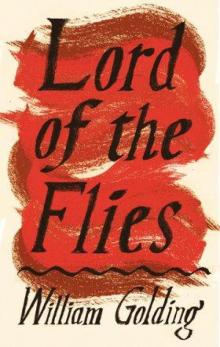 Lord of the Flies
Lord of the Flies To the Ends of the Earth
To the Ends of the Earth Free Fall
Free Fall The Paper Men
The Paper Men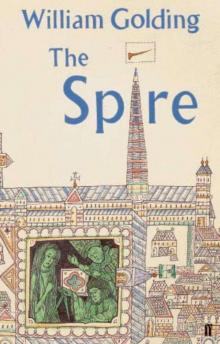 The Spire
The Spire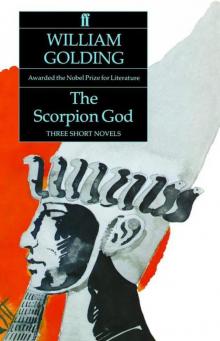 The Scorpion God: Three Short Novels
The Scorpion God: Three Short Novels The Inheritors
The Inheritors Darkness Visible: With an Introduction by Philip Hensher
Darkness Visible: With an Introduction by Philip Hensher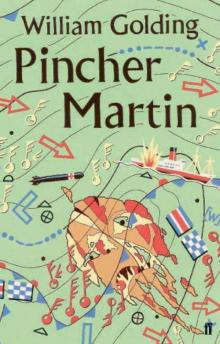 Pincher Martin
Pincher Martin The Pyramid
The Pyramid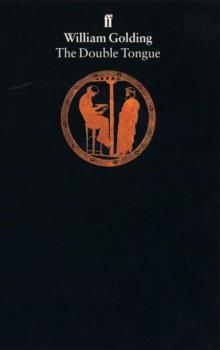 The Double Tongue
The Double Tongue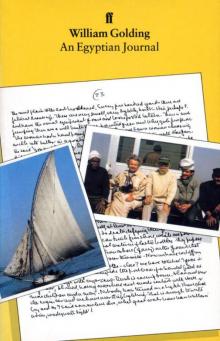 An Egyptian Journal
An Egyptian Journal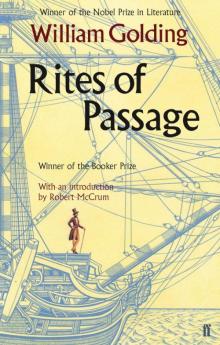 Rites of Passage
Rites of Passage Envoy Extraordinary
Envoy Extraordinary